The Sabbath begins at 7:15 P.M. on Friday, September 16, and concludes at 8:25 P.M. on Saturday in the Vilnius region.
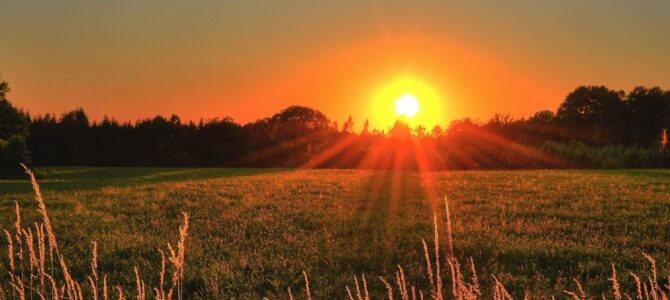

The Sabbath begins at 7:15 P.M. on Friday, September 16, and concludes at 8:25 P.M. on Saturday in the Vilnius region.
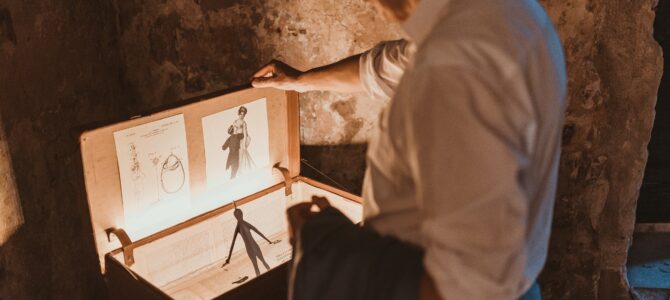
Culture enthusiasts are invited to the first Litvak Cultural Forum on September 29 and 30 at the Great Hall at Vytautas Magnus University in Kaunas. The “Office of Memory” event within the Kaunas Capital of European Culture 2022 program includes a diverse events program at locations around the city.
Academics, historians, museum and education specialists, people from the world of art and members of different communities–the forum will bring them all together. Many of the visitors will be travelling to the land of their parents, grandparents and ancestors for the first time in their lives to attend the forum asking the vital question of what it means to be a Litvak. The forum’s other axis addresses culture and art as the key to history and commemoration as a path to a better future fostering openness and dialogue.
Office of Memory curator Daiva Price says the forum summarizes efforts and projects under the Kaunas 2022 program which have been going on since 2017.
The Table of Truth chess tournament will be held at 11:00 A.M. on September 25 at the Lithuanian Jewish Community in Vilnius.
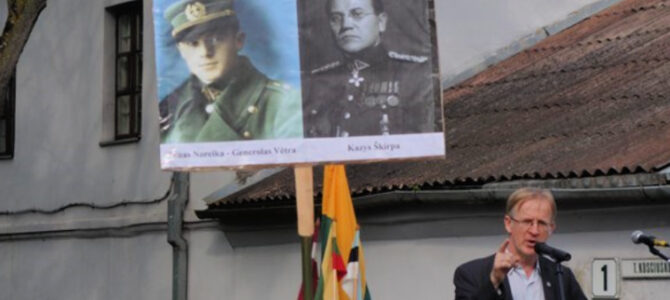
Photo: Arūnas Bubnys, director Lithuania’s Orwellian-named Center for the Study of the Genocide and Resistance of Residents of Lithuania, speaks at a right-wing rally on June 23, 2020, against a backdrop of Lithuanian Nazis Jonas Noreika and Kazys Škirpa. Photo courtesy Dovid Katz.
by Alan Zeitlin
In one scene from the powerful and horrific documentary Baltic Truth, Riga ghetto survivor Marger Vesterman plays the piano to the tune of a song created in the ghetto. He then recalls what the words were: “If you survive, no one has to remind you that you have responsibilities.”
The chilling documentary reminds us that it was not only Nazis who massacred Jews. In this case, Latvians and Lithuanians were all too eager to quench their thirst for Jewish blood, even if it meant shooting neighbors with whom they’d previously celebrated birthdays.
The searing documentary is narrated and hosted by Israeli singer Dudu Fisher. Fisher explains that his mother Miriam was born in Riga in 1932, and that if much of his family hadn’t moved to Mandatory Palestine, he would have been “among the millions of unborn Jewish children.”
The Lithuanian Jewish Community will host new art and dance classes on Sundays.
The Raimondas Savickas Art School is back in session from 10:00 A.M. to 1:00 P.M. on Sundays, call +37069963522 or write savickogalerija@gmail.com for more information and to register.
The Rekudim Israeli Dance Club is meeting from 10:00 A.M. to 12:30 P.M. under the direction of Julija Patašnik with a more advanced group meeting from 1:00 P.M. to 3:00 P.M. under Samuel Garas. For more information and to register, call Patašnik at +37065960512 or Samuel at +37061061035. The dance club is intended for Community members only.
An exhibit curated by Vilma Gradinskaitė, PhD, from the judaica collection of Michailas Duškesas called “A Window on Jewish Life in Kaunas before the Holocaust” is to open September 25 and run till December 15 at the Multicultural Center in Kaunas located at Šv. Gertrūdos street no. 58. The exhibit will be open to the public from 11:00 A.M. to 6:00 P.M. on weekdays, and weekend tours can be accommodated as well by making prior arrangement by calling +370 698 19999 or by writing makabilita.duskes@gmail.com.
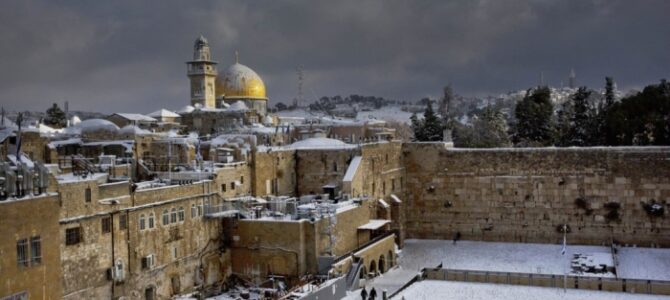
The Sabbath begins at 7:33 P.M. on Friday, September 9, and concludes at 8:43 P.M. on Saturday in the Vilnius region.
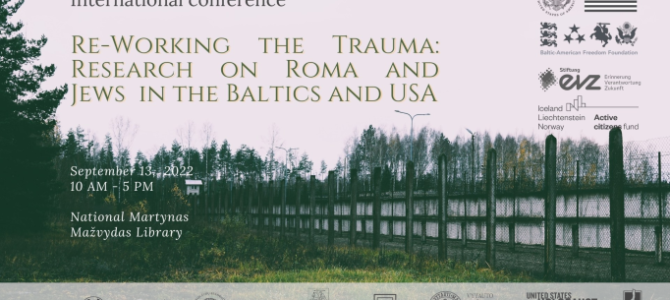
An international conference called “Reworking Trauma: Roma and Jewish History Research in the Baltic States and the USA” will be held at the Martynas Mažvydas National Library in Vilnius from 10:00 A.M. to around 5:00 P.M. on Tuesday, September 13. The goal of the conference is to take a closer look at the social, cultural and political mechanisms used by the Jewish and Roma communities to work through trauma experienced during the Holocaust and what significance these mechanisms hold now in the Baltic states and the United States. The national history narrative often lacks space for “small histories,” the memories and stories of marginalized and voiceless minority communities who suffered so gravely from the tragic events of the 20th century. The main goals are to educate the public on the history of the Roma and Jewish communities in our region, to support academic research in this field and to stimulate international academic cooperation in minority, memory and Holocaust studies.
Anthropologist and US Holocaust Museum researcher Krista Hegburg is one of the main speakers and honored guest. She will also speak at panel discussion at the Vilnius Museum at 6:30 P.M. on September 15.
Other speakers include Volha Bartash from Regensburg University, Dovilė Budrytė from Georgia Gwinnett College, Neringa Latvytė from the Vilna Gaon Jewish History Museum and Vilnius Univeristy, Sholem Aleichem ORT Gymnasium principal and psychologist Ruth Reches, Agnieška Avin from Vyautas Magnus University in Kaunas, Anna Pilarczyk-Palaitis from Vytautas Magnus and Eva-Liisa Roht-Yilmaz from Tartu University.
Program:

Dear reader,
You and your family members are invited to attend a ceremony to commemorate the Holocaust in Panevėžys on September 23, 2022.
Program:
1:00 P.M. Beginning of ceremony at the “Sad Jewish Mother” monument at the Old Jewish Cemetery in Panevėžys
1:30 P.M. Continuation of ceremony honoring Holocaust victims at Ghetto Gate monument
2:00 Participants will be ferried by bus to mass murder site in Kurganava forest
2:20 P.M. Ceremony to remember the victims at the Kurganava mass murder site (following which participants will be returned to Panevėžys by bus).
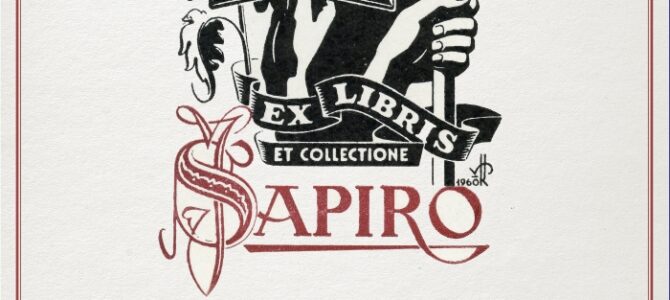
The Immanuel Kant Public Library in Klaipėda is hosting an exhibit of ex libris plates called “Traces of Jewish Culture” which opened September 2 and will run till September 20. Josef Šapiro was an avid collector and creator of ex libris graphics and once ran the world’s only ex libris museum inside the building housing the Lithuanian Jewish Community. His book plates and others will be on display for the public, touching upon a variety of topics, including the Jewish people in Lithuania.
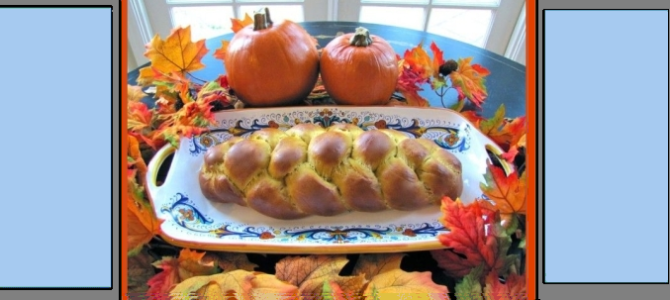
The Sabbath begins at 7:50 P.M. on Friday, September 2, and concludes at 9:03 P.M. on Saturday in the Vilnius region.
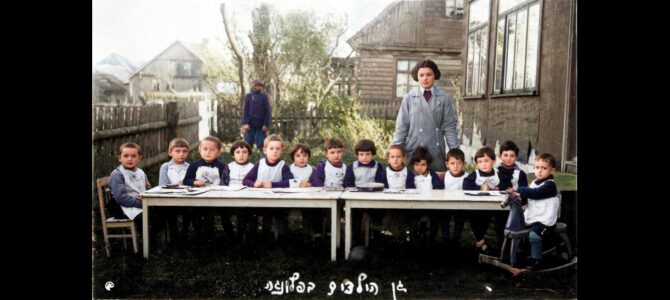
Photo: Jewish nursery school in Plungė, Lithuania. Almost no Jewish children survived in Lithuania. Photo source: Screenshot from the documentary J’Accuse
Renowned cantors unite to give their voices to Baltic Truth premiere
There were very few survivors from Lithuania. In the villages, there were almost none. We know what happened in some locations because we have testimonies from some survivors.
Yakov Zak testified about the Lithuanian Holocaust: “The rabbi of Kelmė, Kalmen Benushevits, who had escaped to Vaiguva at the outbreak of the war, had been brought together with the Jews from Vaiguva. He had been forced to kneel next to the pit the entire day. He had quietly whispered a prayer, watching while the Jews were shot. After all the Jews were shot, he was shot as well.”
And:
“The mystic religious melodies of the yeshiva students, their rabbis and leaders were eternally silenced. The town was ruined down to the foundations; the Jewish community of Kelmė was ruined forever. Peasants also related that while the yeshiva students were being taken to be shot, they did not weep. Like stone statues, they moved slowly, with their eyes raised to the sky, murmuring prayers.”
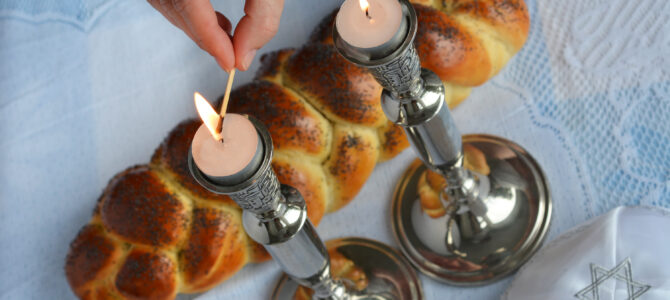
The Sabbath begins at 8:08 P.M. on Friday, August 26, and concludes at 9:22 P.M. on Saturday in the Vilnius region.
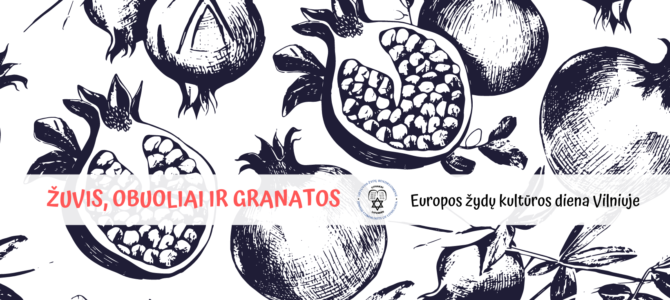
This year will be the seventh the Lithuanian Jewish Community is holding events for the European Days of Jewish Culture. This year’s theme is renewal.
Renewal is woven into almost all aspects of Jewish life. Jewish life is continually building on the past in new ways, bringing a sense of constant change along with a reassuring sense of continuity. The Jewish New Year opens with the festivals of Rosh Hashana and Yom Kippur. These holy days through their traditions and prayers present an opportunity to reflect on and acknowledge our past actions while looking ahead with new resolutions, optimism and determination. During this period we reconcile personal and communal differences within ourselves and with others as we actively strive to renew our aspirations for the coming year, and beyond.
We invite you to attend the events, all of which are free and open to the public.
Register here, space is limited.
Program:
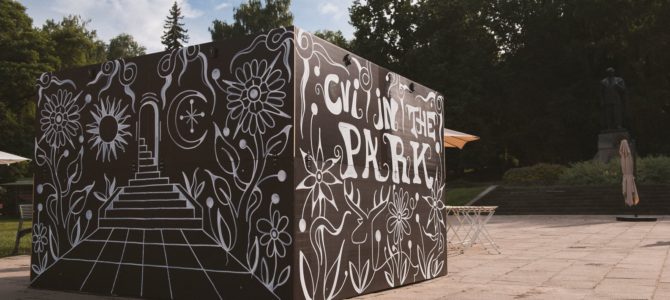
Come to celebrate the last sabbath of the summer at the Cvi Park Israeli food kiosk with Israeli dancing. The event starts at 6:00 P.M. on Friday, August 26. The event is free and open to the public.
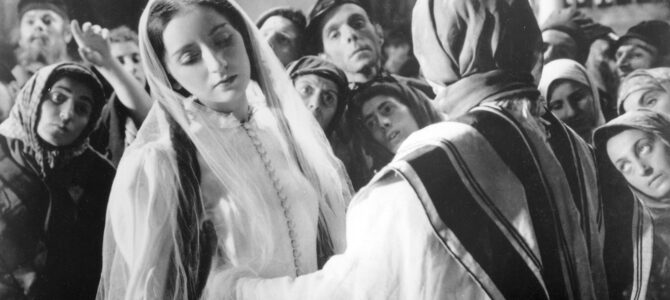
The Jerusalem Theater Archive and Museum is hosting an exhibit to mark the 100th anniversary of the staging of S. An-sky’s “Dybbuk” at the Habima Theater in Moscow. The exhibit opened August 8 at Hebrew University on Mount Scopus in Jerusalem, according to Birobaidzhaner Shtern.
An-sky’s “Dybbuk, or, Between Two Worlds” was written in Yiddish. The Moscow production was translated to Hebrew by Evgeny Vakhtangov and Haim-Nahman Bialik. The Vilner Troupe presented the play in Yiddish in Warsaw in 1920, directed by Dovid Herman. The Polish film “Dybbuk” directed by Michał Waszyński was shot in 1937 and marks the birth of Yiddish cinema. The Hebrew-language production in Moscow, however, is considered special because its success became a kind of calling card for Habima, which in turn eventually became the National Theater of Israel.
Full article in Yiddish here.
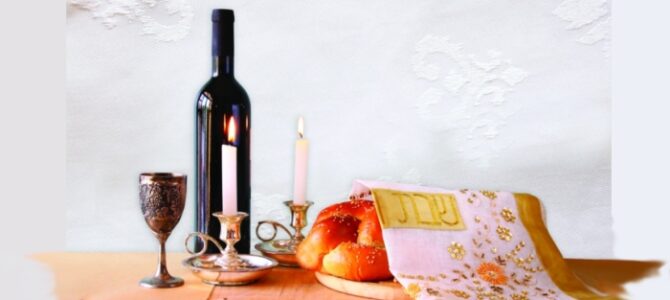
The Sabbath begins at 8:24 P.M. on Friday, August 19, and concludes at 9:41 P.M. on Saturday in the Vilnius region.
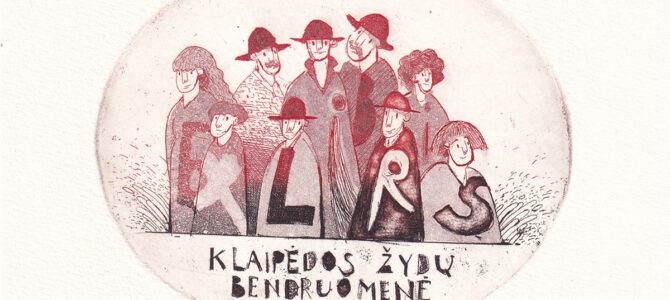
The International Festival of Jewish culture “Shalom in All The World” returns to Klaipėda.
This year, the International Festival dedicated to learning about the history, culture, art, and traditions of the Jewish society will be held for the second time and is part of the program of events dedicated to the 770th anniversary of the city of Klaipėda. During the events of the Festival, the aim will be to emphasize the historical roots of the Jewish society in Memel, specifically the contribution of the Jewish residents to the development of the city in that time
Full of events, an enthralling and significant Festival will again invite everyone, regardless of their nationality, religion, beliefs, to meet at the concerts, talks, movie screenings, exhibitions, creative workshops, traditional Jewish dance lessons, excursions.
Youth, adults, families, regardless of age, education, interests are very welcome! All events are free of charge! Be with us and among us!
Full program here.
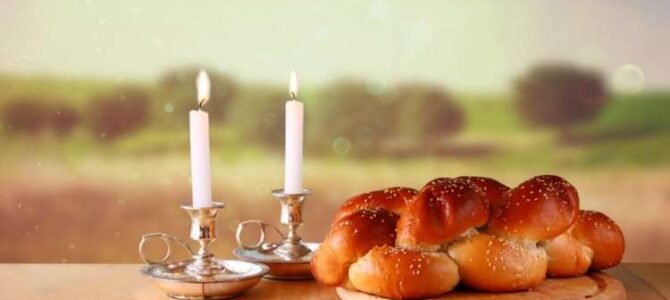
The Sabbath begins at 8:40 P.M. on Friday, August 12, and concludes at 9:59 P.M. on Saturday in the Vilnius region.

The Jerusalem of the North youth orchestra camp will take place from August 15 to 25 at the Preila Library in Preila on the Curionian Spit in Lithuania under the tutelage of renowned Lithuanian conductor professor Donatas Katkus, Martynas Švegžda von Bekker, Dalia Dedinskaitė, Gleb Pyšniak and Darius Mažintas. The 10-day orchestra workshop will conclude in a joint concert with Vilnius’s St. Christopher Orchestra and the new orchestra made up of young participants, performing a jointly-prepared program of Jewish music.
“The Jewish culture of education means the book, music and sports. It’s not for nothing that the Jewish people have been literate for more than 5,000 years. The Lithuanian Jewish Community is happy the orchestra convened at this camp will perform Jewish music. That there aren’t many Jewish children attending the camp this year is, I think, a tourism mistake. Israeli families would love to vacation in Nida while their children attend camp and learn. There should be greater state support brought to these sorts of private and NGO initiatives. The children and adults who will prepare this concert will learn about Jewish composers. We all know how to talk about tolerance, but not all of us know how practice tolerance through deeds. The LJC and the orchestra are doing tolerance, which is what the state institutions should be doing,” Lithuanian Jewish Community chairwoman Faina Kukliansky explained.